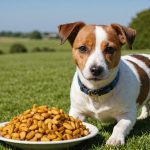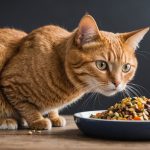Understanding the Nutritional Needs of Rottweiler Puppies
Feeding your Rottweiler puppy is not just about filling their belly; it’s about supporting their growth and development. Rottweiler puppy nutrition requires a balance of essential nutrients to ensure they grow into healthy adults. The two most critical components in their diet are protein and fat. These macronutrients are vital for muscle development and maintaining energy levels. A high-protein diet supports robust muscle mass, while healthy fats provide energy and aid in nutrient absorption.
It’s crucial to include key vitamins and minerals in their diet. Vitamins such as A, D, and E are essential for bone development and immune function. Additionally, essential minerals like calcium and phosphorus contribute to strong bone and dental health.
A lire aussi : Effective Strategies to Curb Aggression in Rhodesian Ridgebacks During Dog Walks
Age and activity level significantly influence a puppy’s dietary needs. As they grow, their nutritional requirements evolve. A young, active Rottweiler puppy will require a diet rich in protein and fat to support their vigorous lifestyle. Conversely, older puppies may need adjusted caloric intake to prevent obesity and related health issues.
Considering a raw diet? Understanding the raw diet basics involves ensuring meals are balanced with proteins, fats, and necessary micronutrients. Each meal should cater to the puppy’s changing needs as they mature.
Lire également : Effective Strategies to Curb Aggression in Rhodesian Ridgebacks During Dog Walks
Choosing Appropriate Food Sources for a Raw Diet
Selecting the right raw food sources is vital for ensuring a balanced diet for your rottweiler puppies. The diet should provide adequate protein sources to support their growth and health.
Types of Meat Suitable for Rottweiler Puppies
When considering meat choices, quality is crucial. Beef, chicken, and lamb are excellent protein sources that can meet the dietary needs of growing puppies. These meats are rich in essential nutrients and amino acids, fostering muscle development and overall health. It is important to ensure that the meat is fresh and handled properly to avoid any risk of contamination, maintaining the puppy’s health.
Incorporating Organ Meats and Bones
Organ meats, such as liver and kidneys, play a significant role in a balanced diet due to their vitamin and mineral content. These meats provide essential nutrients like vitamin A, iron, and zinc, promoting healthy body functions. Bones also contribute to oral health and provide calcium, but they must be appropriate in size to prevent choking hazards and ensure safe consumption.
Vegetables and Supplements for a Complete Diet
Adding vegetables and supplements enhances the puppy’s diet. Vegetables like carrots and spinach offer vitamins and fibre, while supplements such as fish oil provide omega-3 fatty acids. These elements support overall well-being and should complement the protein sources as part of a nutritionally complete diet.
Creating Balanced Meal Plans for Rottweiler Puppies
Feeding Rottweiler puppies a balanced diet is crucial for their growth and health. Meal planning should encompass the right ratios of protein, fat, and carbohydrates. A recommended protein ratio in their diet is around 22-28%, supporting muscle development and overall health. Fat should comprise about 8-12% of their intake, providing energy and assisting in absorption of essential vitamins. Carbohydrates should be maintained at approximately 30-35% to fuel their energetic play.
Sample Raw Diet Recipes
When considering raw diet recipes, a balanced approach is key. A simple recipe might include:
- 60% raw meat (like chicken or beef)
- 10% organ meat for vitamins and minerals
- 20% ground bones or suitable bone meal for calcium
- 10% vegetables such as carrots or sweet potatoes for fibre and vitamins
Feeding Guidelines and Growth Phases
It’s essential to follow feeding guidelines and adjust meals based on your puppy’s growth phases. As puppies grow, their nutrient needs evolve. Increase portion sizes during growth spurts, and regularly monitor their weight. Adjust the fat content if your puppy is too thin or overweight. Including diverse foods in their meal planning develops taste preferences and ensures nutritional variety. Always consult with a veterinarian to tailor the diet accurately for your puppy’s unique needs.
Implementing a Transition to a Raw Diet
Transitioning your puppy’s diet from kibble to raw food can be a rewarding process when performed correctly. Start by gradually introducing your puppy to the new diet. Over a period of 7-10 days, mix small portions of raw food into your puppy’s existing meals, increasing the quantity daily until the switch is complete. Monitoring your puppy’s response during this period is crucial. Look for changes in energy levels, stool consistency, and coat condition – these indicate whether the new diet is well-received.
In setting up a consistent feeding schedule for raw meals, aim to feed your puppy twice a day. Puppies have fast metabolisms and require frequent meals to sustain their energy needs. Consider similar meal times daily to establish a routine. The exact feeding times can be adjusted according to your puppy’s individual rhythm and your daily schedule, but consistency is key.
Throughout the raw food transition, pay attention to your puppy’s weight and appetite. If any adverse reactions or reluctance occur, slow the transition pace, or consult a veterinarian. This measured approach ensures the transition respects your puppy’s health and dietary needs, promoting a smooth adjustment to their new diet.
Health Benefits of a Raw Diet for Rottweiler Puppies
Feeding your Rottweiler puppy a raw diet can provide several significant health benefits. The most noticeable change for many owners is the improvement in the puppy’s coat health. A nutritious, balanced raw diet often results in a shinier and softer coat due to the natural oils and nutrients present in raw food.
Beyond appearance, a raw diet has been linked to heightened puppy health in terms of energy levels. Many puppies display increased vitality and playfulness, largely attributed to the high-quality protein and fats found in raw foods. These nutrients are more readily digested and metabolised, giving puppies the endurance they need for optimal growth and play.
An often-overlooked advantage is the support a raw diet provides to a puppy’s immune system. Raw diets are rich in vitamins and minerals essential for building and sustaining immunity. Higher immune support means fewer trips to the vet and a robust defense against various common ailments.
Over time, a balanced raw diet can have profound long-term health implications. Puppies raised on raw diets are less likely to develop certain allergies and digestive issues, making it a sustainable and beneficial choice for lifelong health and vitality. By choosing a raw diet for your Rottweiler puppy, you’re investing in their overall wellness and future well-being.
Addressing Common Concerns About a Raw Diet
Adopting a raw diet for your puppy can be daunting given the various raw diet concerns. One of the frequent misconceptions is that raw feeding lacks balanced nutrition. However, with proper ingredient selection and portion control, a raw diet can be well-balanced and nutritious.
Feeding risks are another concern among pet owners. The main risks involve exposure to bacteria like Salmonella. To mitigate these, ensure proper food handling, hygiene practices, and storage to prevent contamination. It’s crucial to source ingredients from reputable suppliers.
Regarding puppy health advice, consulting with veterinarians before transitioning to a raw diet is advisable. Expert guidance can help tailor diet plans to meet the specific health needs and growth requirements of puppies, ensuring they receive all necessary nutrients.
Veterinary advice can also support pet owners in adapting a raw diet effectively. Many vets provide support in adapting dietary changes and monitoring the puppy’s response to new meals. Regular check-ups facilitate adjustments that promote a healthy, thriving pup while maximizing the benefits of raw feeding.
Continuing research and learning about raw diets will help make informed decisions, address misconceptions about raw feeding, and help maintain your puppy’s health and well-being.










